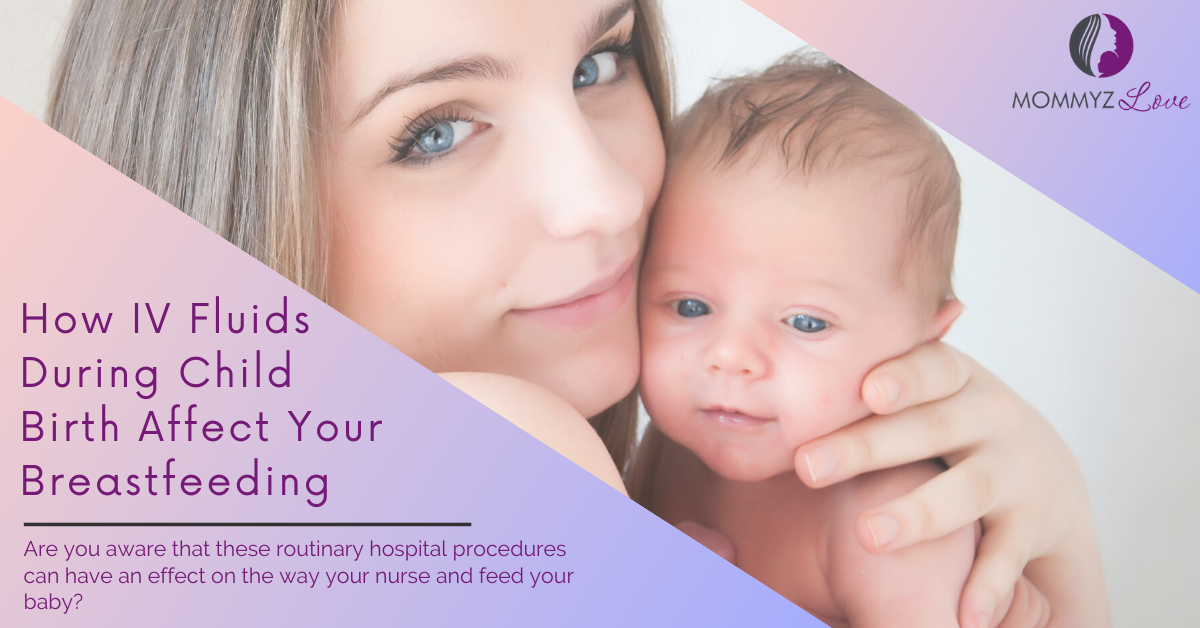Are you entering your 37th week of pregnancy? It’s time to look forward and expect the arrival of your little one! We’re sure you’ve done your research with regards to your birthing options. One age-old hospital practice during labor and delivery is the use of IV fluids. But are you aware that these routinary hospital procedures can have an effect on the way your nurse and feed your baby? Here’s a comprehensive evidence-based look into the effect of IV fluids on breastfeeding!
In A Nutshell…
- IV fluids have been routinely given to mothers during childbirth to prevent dehydration and to be able to administer pain medications.
- Despite the common practice, this labor procedure lacks evidence to support the advantages of its use. Many health organizations like the ACOG, WHO, and ASA have NOT been recommending the use of IV fluids during labor and delivery.
- The effect of IV fluids extends even with breastfeeding. Increased IV fluids result in excess newborn weight loss, supplementation of formula milk, parental anxiety leading to discontinuing breastfeeding, and breast pains and swelling.
- Consult your doctor or birthing team with regards to your IV fluid alternatives. Consider using a heparin lock, a clear liquid diet, or doing non-medicinal pain relievers.
What Is An IV Fluid?

Intravenous (“IVs”) fluids are used to efficiently transport substances, like water or medications, directly through your veins. Most hospitalized patients are administered with IV fluids in order to maintain hydration, especially when they are ordered to take “nothing by mouth” (NPO).
Effect of IV Fluids On Breastfeeding When Used During Labor
For those that chose to give birth in a hospital, having IV fluids at the ready has been part of the routinary package. Dehydrations during labor and delivery can result in increased interventions and complications. Thus, many hospitals try to prevent this by administering IV fluids. In the US alone, about 62% of mothers are reported to receive a continuous “drip” intravenous (IV) fluids during their labor.
In addition, IV fluids have been mandatory given to women that would want epidurals or other pain-relieving medications. They help minimize the side effects of these intense drugs, like a sudden drop in blood pressure. In certain instances, having IV fluids can be useful too if:
- You are at risk for complications during delivery
- There’s a need to be induced with Pitocin
- Having a C-section
- Prescribed antibiotics and other medications in labor
Are IV Fluids Necessary During Labor?

Giving birth is quite the exercise, which is why it’s best to keep yourself hydrated throughout the process. However, because it’s been a common practice, many hospitals in the United States still do not allow women in labor to eat or drink anything (“NPO” or nothing by mouth). Although routinary, this labor procedure lacks evidence to support the advantages of its use.
The principle of “nothing by mouth” while labor and delivery started in the 1940s. Back then, doctors had a fear that in the case a woman has to go into an emergency cesarean delivery, a stomach filled with foods and liquids could possibly aspirate into the lungs. Today, with the advances in modern medicine and surgery, this accident has become uncommon.
Thus, according to the American Congress of Obstetricians and Gynecologists (ACOG), the World Health Organization (WHO), and the American Society of Anesthesiologist (ASA), women who expect to have a normal and healthy delivery are not recommended to take in IV fluids.
Effect of IV Fluids On Breastfeeding

The use of IV fluids can be beneficial in special and complicated birthing cases. But more often than not, the risks outweigh the advantages:
- Labor and delivery become restrictive. When tied up to an IV drip, most basic movements would be restricted. This can increase the length of labor, increase the use of Pitocin to strengthen contractions and speed up labor, and affect your ability to cope up with pain.
- Your energy levels become depleted. Relying on IV fluids instead of eating and drinking during labor depletes a person’s energy levels. Running on pure dextrose solutions won’t be enough to give you endurance and stamina to ride through childbirth.
- Breastfeeding becomes challenging. The problem with IV fluids is that some women have a tendency to become over-hydrated. Too much fluid is also bad as it causes swelling in the hands, feet, and also the breasts. Moreover, over-hydration can occur on the babies, making them lose weight. Both of these IV-related issues can cause breastfeeding challenges in the long run.

Increased IV Fluids Results in Newborn Weight Loss
Nurses, doctors, midwives, and lactation experts have continuously observed a trend with some newborn babies losing substantial weight, despite getting to breastfeed. Most moms immediately think this might be due to low milk supply, but research suggests that it might actually have to do with their IV fluid intake while they were in labor.
A study at the University of Ottawa confirmed a link between maternal IV fluids during labor and newborn weight loss. According to their research, “ They found that during the first 24 hours following birth, there was a positive association both between the IV fluids given to mothers before birth and neonatal output and between the neonatal output and newborn weight loss. At 60 hours post-birth, the time of the average lowest weight, there was a positive relationship between maternal IV fluids and newborn weight loss.”
Formula Milk Is Introduced Due To Guidelines
Typically, newborns are weighed right after being born. This measurement is essential as baseline data in order to find out whether or not a mother is doing well with her breastfeeding. According to clinical guidelines, infants who lose more than 7% of their birth weight after three to five days are recommended to supplement with formula milk instead of insisting breastfeeding.
However, more and more studies are showing the association between maternal IV fluids and newborn weight loss. Infants with mothers that used IV fluids while giving birth were likely to be over-hydrated. That’s why, just in the first hour after birth, they urinated more. One study reported that babies drop as much as 10% after three days. For those that are breastfed, about 16-19% of newborns experienced weight loss.
But since the formula feeding guidelines were made before these studies were published, more than half (58%) of newborns were supplemented with formula despite the mother’s intentions to breastfeed.
Parents Grow An Anxiety, Opting To Discontinue Breastfeeding and Switch To Formula
Feeding your child with your own milk can be a very rewarding experience. The first week of breastfeeding is expected to be the transitory period. By this time, you only have a little milk supply since your newborn’s tummy can only hold so much. Although a low milk supply is assumed, most moms are still concerned about whether or not they’re getting to feed their child enough.
Researchers have also investigated the link between excess weight loss and a mother’s anxiety about her milk supply. Since the use of IV fluids is associated with excess weight loss in newborns, many moms fear that they are not feeding their child adequately. This parental anxiety leads them to supplement with formula instead and cease breastfeeding.
Breast Pains Are Common Effect of IV Fluids On Breastfeeding
Breastfeeding pains are not uncommon, especially in the first few days after giving birth. Once a mother figures out the proper latching, positions, and techniques, these breast pains should subside after a while.
However, a study in Canada observed that out of the 87% women that initiated breastfeeding, about a quarter of them stopped after a month. Several women frequently complained of breast and nipple pains. From the observations of the researchers, they figured that IV fluids during labor had contributed to postpartum breast swelling.
IV fluids can cause over-hydration, so edema in the different parts of the body, including the breasts, has become more likely to happen. Women that received IV fluids reported breast tenderness and firmness after giving birth. A swollen breast can be painful, which can also make breastfeeding a little more difficult.
How To Avoid The Effect of IV Fluids On Breastfeeding
It’s good to discuss the options and alternatives to maternal IV fluids with your doctor even before going into labor. Some hospitals have policies regarding IV fluids when giving birth, but some allow you to compromise.
- A heparin lock (wherein a catheter is placed in the vein without a line or drip attached to it) is a good option as it allows mobility. And in case of emergency, an IV drip can be immediately administered.
- Ask if you can eat and drink orally. As for your nutrition during childbirth, you should be able to have the choice of getting to eat and drink orally to maintain energy and hydration. Ask your doctor or doula about your nutrition and hydration plan as they might allow a clear liquid diet if in case you want to avoid having an IV drip.
- Consider doing non-medicinal pain relievers. Pain medications like epidurals are usually given through the IV. But childbirth can be medication-free if you learn to practice natural relieving techniques. Having a doula is a good alternative as they coach you through labor and delivery.
In Summary…
Although a common hospital practice, studies have been showing that the use of IV fluids during childbirth can have more risks than benefits. The effect of IV fluids on breastfeeding can lead many women to supplement with formula milk instead. To avoid breastfeeding complications and challenges, it’s good to discuss with your IV fluid alternatives with your health care provider.
Want to learn more about this topic? I gave an in-depth discussion on a previous post!






